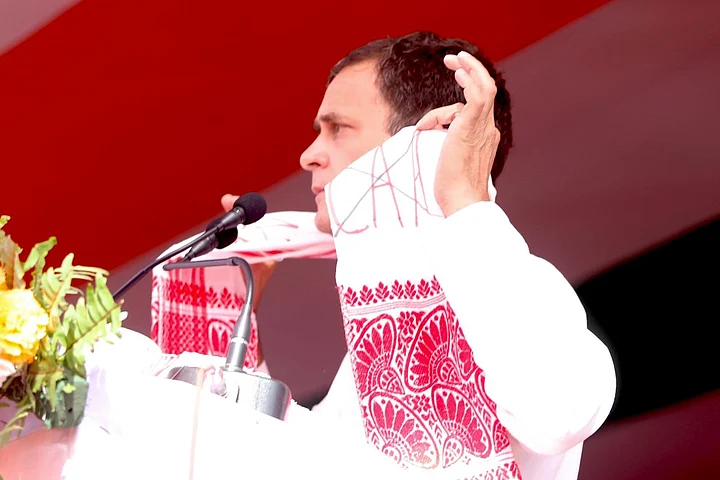It is not surprising that both the Bharatiya Janata Party (BJP) and the Congress used Sivasagar to launch crucial aspects of their campaign for the Assam Assembly elections. Being the capital of the Ahom kingdom between 1699 and 1788, the city is of immense symbolic importance.
While the BJP organised the distribution of land certificates by Prime Minister Narendra Modi at Sivasagar in January, the Congress on 14 February chose the city to put forward its main narrative for the upcoming elections.
"The Citizenship (Amendment) Act will never be implemented...we will oppose it tooth and nail," former Congress President Rahul Gandhi said at the rally in Sivasagar.
The CAA has been a major source of disaffection in Assam.
The Gamosa Card
During the rally, Rahul Gandhi, Chhattisgarh Chief Minister Bhupesh Baghel, top Assam Congress leaders like Assam unit chief Ripun Bora, MPs Gaurav Gogoi and Pradyot Bordoloi, Leader of the Opposition Debabrata Saikia, Sushmita Deb, Rockybul Hussain, besides state in-charge Jitendra Singh, all wore the Gamosa with the letters CAA crossed out.
The Gamosa – a rectangular white piece of cloth, with a red border having a traditional pattern – is almost synonymous with the Assamese identity and culture.
Using the Gamosa to spell out the party's clear position against the CAA sends a clear sign that the Congress is trying to take up the mantle of Assamese ethnic nationalism in this election.
Rahul Gandhi also said that the Congress will defend the Assam Accord at all costs.
Throughout the rally, Gandhi and other Congress leaders like Leader of Opposition Debabrata Saikia, accused the BJP of "selling out Assam" to businessmen from outside, particularly from Gujarat.
The BJP’s response to the Congress’ rally was mainly a social media trend accusing Rahul Gandhi of insulting the Gamosa.
However, this couldn’t take away from the fact that the most important political development from the rally was the Congress’ stand on CAA.
Congress Picks a Side on CAA
The Congress' clear assertion that it won't allow the CAA to be implemented in Assam is a slight change from the party's earlier strategy. Though the Congress had opposed the CAA in Parliament, initially it didn't seem too keen on raising it for the Assam elections. The argument given for this restraint was that it could alienate Bengali Hindu voters in the Barak Valley.
It is important to remember that after the CAA was passed in Parliament in 2019, it sparked protests in the Brahmaputra Valley, with Assamese-speaking people fearing that it would undo the entire NRC exercise and lead to changing the demography of the state. On the other hand, there were celebrations in the Barak Valley where Bengali-speaking Hindus are dominant.
The CAA may benefit the Bengali-speaking Hindus left out of the National Register of Citizens, therefore this section gains the most due to CAA.
The Congress has now picked a side on the CAA. And this is a calculated risk.
A Calculated Risk
The BJP has even historically been strong in the Barak Valley and its hold may have increased following the CAA. A section of Bengali-speaking Hindus who may be fearing suffering due to the NRC, see the BJP as the only party safeguarding their interests.
Given these circumstances, it seemed unlikely that the Congress would be able to dent the BJP's support in this section beyond a point.
The Congress seems to have figured out that the real vacuum lies among Assamese-speaking voters. There is some resentment in this section with the BJP due to the CAA or ‘Kaa’ as it is called locally.
So far, it was the All Assam Students' Union (AASU) and its recently formed political outfit Asom Jatiya Parishad that were leading the charge against the CAA.
The Congress now wants to tap into this vote. It is possible that this could lead to some kind of understanding with the AJP or at least help the Congress reach out to some of their supporters.
Had the Congress not taken this stand, it would have run even greater risk of losing anti-BJP Assamese votes to the AJP and its ally Akhil Gogoi's Raijor Dal.
Congress Promises Rs 200 Wage Hike for Tea Garden Workers
The other major announcement at the Sivasagar rally was Rahul Gandhi's promise that the Congress will raise the daily wage rate for tea garden workers from Rs 167 per day to Rs 365 per day. This exceeds even the wage rate being demanded by protesting tea garden workers, which is Rs 351.33.
Gandhi even said, “Where will the money come from? From Gujarati merchants of course.”
Making this promise is a clever move, as the Congress has tried to pre-empt any mileage the BJP would get from an imminent wage rate hike. Assam Deputy Chief Minister Himanta Biswa Sarma has said that the wages will be increased in a few days. But it is unlikely to be more than the wage rate promised by the Congress.
The Congress has made an aggressive start to its campaign. Already, it is running a social media campaign titled '#AssamBachao' or '#AxomBasaonAhok'. With the Sivasagar rally, the party has made it clear that it is going to try and set the narrative in these elections.
